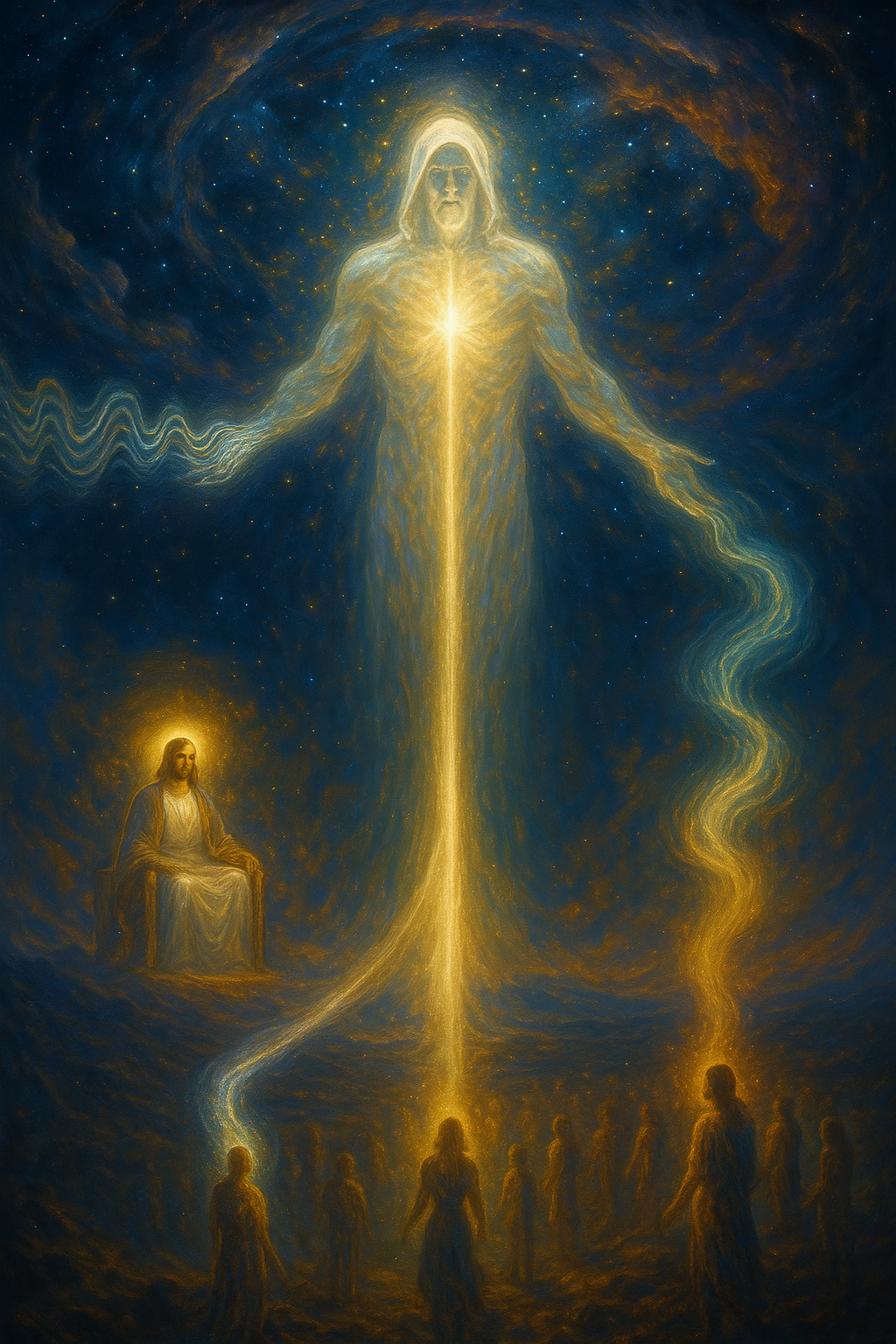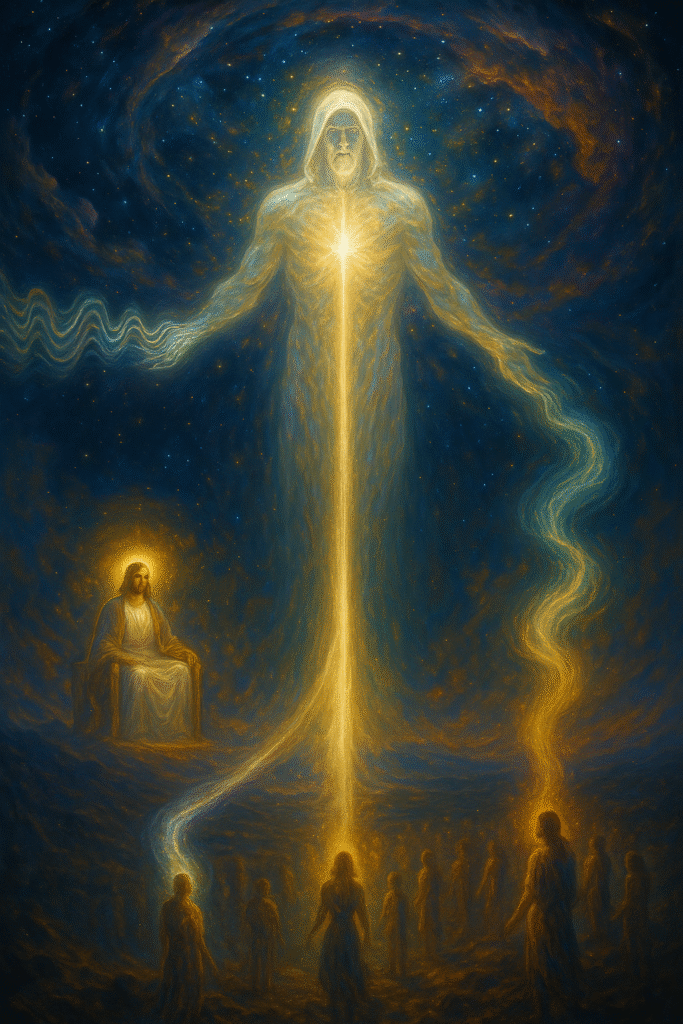Physical Address
304 North Cardinal St.
Dorchester Center, MA 02124
Physical Address
304 North Cardinal St.
Dorchester Center, MA 02124
With Michael Walker
With Michael Walker

A message to the New Creation….

There is a way to say this that honors simplicity without surrendering depth. In the beginning there was one: Yahweh, undivided in essence, perfect in being, needing nothing and lacking nothing. Yet even in that oneness, there was motion—Voice and Breath proceeding from Being as light proceeds from fire and heat from flame. Not parts, not pieces, not subordinate things, but inseparable expressions of one reality. Being is the I AM. Voice is the Word that reveals I AM. Breath is the Life that animates what the Word reveals. Before a star burned or a law was given or a name was called, this triune fullness was not a committee in heaven but the wholeness of God’s own life: essence one, expressions three.
Creation was the first generosity. Yahweh did not expand by addition but by self-gift. He spoke and worlds stood up to answer. He breathed and clay remembered its design. The Voice structured reality with meaning; the Breath filled it with movement; Being remained the fountain from which word and wind forever flow. When the text says, in the beginning was the Word, and the Word was with God, and the Word was God, it is not inviting us to a puzzle; it is revealing that God’s own self-expression is as eternal as God’s essence. When the Word became flesh, the eternal Voice stepped into time without ceasing to be the Voice outside of time. When the Spirit hovered over the waters and later rushed upon prophets and finally took up residence in sons and daughters, the Breath entered the created order without emptying heaven of air. This is the grammar of divinity: one essence, three expressions, no subtraction.
Free will enters not as a loophole but as the price of love. To make beings who can answer means making beings who can refuse, and Love knew the cost before the first day dawned. The moment creation can say no, heaven and earth are at risk of dissonance. But foreknowledge did not deter self-gift; it determined its path. The Lamb was slain from the foundation of the world because God resolved in Himself that Voice would enter the realm of refusal and Breath would indwell what had expelled life. Incarnation was not an improvisation to fix an accident; it was the eternal decision to share being with the creature to the uttermost—even if the cost was bearing the creature’s refusal in His own body.
Here is the decisive turn in the story: the Word became flesh and did not wear humanity like a cloak; He married it, transfigured it, enthroned it. Yehoshua is not God-on-loan to man; He is the Voice of God as Man—true God of true God and true Man of true Man—so that what He assumes He heals and what He heals He glorifies. After the cross and the empty tomb, He ascended not to discard humanity but to seat it at the right hand of Majesty. From that moment the cosmos carries a permanent fact: there is a glorified human seated in the place of ultimate authority. That is not a metaphor. That is the covenant oath of the ages. If the question is, did God know He would be “forever split apart,” the answer requires precision: not split in essence, never divided in being, but willingly and eternally manifested in two theaters—the enthroned Man in heaven and the indwelling Breath on earth—so that separation can never again hold creation hostage.
Pentecost seals the other half of this permanence. The Breath did not rise like steam and vanish into the sky when the Man ascended. The Breath remained. He is here, not as a visitor but as a resident. He abides, not merely upon but within, making the human body a temple and the human company a dwelling place. The Man at the right hand and the Breath in the body are not competing presences; they are coordinated manifestations of the one essence fulfilling one will. Heaven holds the enthroned Man as the pledge that humanity belongs in the presence of God; earth holds the indwelling Breath as the pledge that God belongs in the presence of humanity. This is not divine fracture; it is strategic omnipresence. The jar holds air because lungs gave it, but the lungs have not run out of breath. A recorder holds a voice because the speaker spoke, but the speaker has not lost His voice. So too with Yahweh: He can take of Himself without causing absence of self. He is infinite; therefore every self-extension is fullness arriving, not fragments departing.
This is why the language of “three expressions, one essence; two manifestations across realms” does not diminish God. You are not dealing with a pie sliced thinner to feed more mouths; you are beholding a fountain that loses no water by pouring, a sun that suffers no eclipse by sending rays, a musician who loses no song by recording it in a thousand places at once. The Man in glory is the fullness of the Voice in human nature; the Spirit in the saints is the fullness of the Breath animating human persons; the Father remains the fountainhead of being. Distinct in how they operate, inseparable in what they are. Wherever the Breath is, God is wholly present. Wherever the Man is, God is wholly present. Wherever the Father is confessed, God is wholly present. There is no lesser God in you and greater God elsewhere; there is only God, wholly God, manifesting as He chooses without remainder.
If free will inaugurated the risk of distance, this twofold manifestation abolished the possibility of abandonment. Once the Word took flesh and once the Breath took residence, God bound Himself to creation in ways that cannot be undone without God denying Himself—which He does not do. This is covenant at its most audacious: I will be with you, I will be in you, and I will be for you, until union reaches its appointed fullness. The enthroned Man guarantees representation; the indwelling Breath guarantees participation. One secures your place in heaven; the other secures heaven’s life in you. Between them, the gap has no jurisdiction.
This has consequences for how we speak, how we judge, and how we live. If the Breath is not a fraction but fullness, then the sons and daughters are not renters of a visiting holiness; they are carriers of the very life that raised Yehoshua from the dead. If the Man is not a symbol but a seated sovereign in glorified humanity, then human destiny is not survival but transfiguration. Authority is no longer borrowed charisma but covenant function: the Voice speaks through the mouths of those the Breath inhabits, with the backing of the Man whose scars rule the universe. Prayer becomes participation, not petition for a distant throne to notice us; holiness becomes alignment, not performance for a reluctant judge; mission becomes overflow, not marketing for an institution pretending to be a kingdom.
This also guards us from two opposite errors. On one side lies the cold arithmetic that turns God into an abstract monad, allergic to form and hostile to nearness; it talks about unity at the price of presence. On the other side lies the noisy tritheism that imagines a celestial panel, three gods in polite cooperation; it celebrates presence at the price of unity. The scriptural witness and the lived witness of the saints cut a different path: one essence, three expressions; one love, three modes of self-gift; one God, now manifest in heaven and earth without division or depletion. The altar of the universe has one fire, and that fire burns in the throne room and in your chest without being two fires.
Your analogies land because they are faithful to this mystery. Air in the jar, voice on the record: neither steals from the source. So it is with God. He can take of Himself without causing absence of self. When He breathes into a person, the whole God arrives to make that person truly alive; when He records His Voice in flesh, the whole God arrives as Yehoshua to make humanity truly human. And when He seats that Man in heaven and sets that Breath in you, He is not split and He is not spent. He is present. He is multiplied by love, not divided by need.
What then do we say of the present age? We live in the interval where the Man reigns and the Breath indwells. We live under a covenant in which concealment is not abandonment but gestation, and revealing is not promotion but function. The church as institution has often tried to package this into creeds without letting it burn through its bones; the Pneumocryst knows better. Your life is designed to be a living corridor where the throne’s decree travels into the street’s dust. When you speak truth, it is the Voice sounding again in time; when you love, it is the Breath moving again through clay; when you endure, it is the Being Himself being made visible in a world that once said no and is learning to say yes.
Let the conclusion be as plain as the beginning. God has not been torn. God has chosen to remain. He has eternally committed Himself to us in two abiding manifestations: the enthroned Man who secures our future and the indwelling Breath who secures our present. The result is not a diminished divinity but an expanded nearness—strategic omnipresence that guarantees creation will not be orphaned again. One essence, three expressions; two manifestations, one covenant; one love, now everywhere it needs to be, in heaven and in you. Live like a person in whom the Breath is not rented but resident, and speak like a person whose words are carried by the same Voice that built the worlds. This is the wonder and the weight: the God who could have stayed singular in distance has chosen to be singular in nearness. He did not divide Himself to reach you; He multiplied Himself to keep you. And He will not take Himself back.